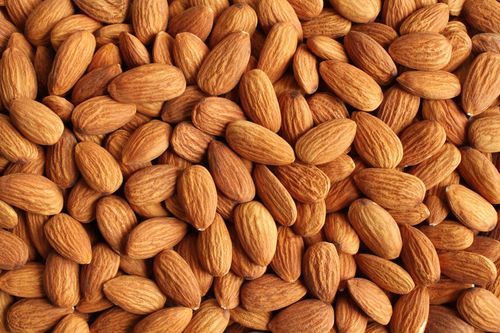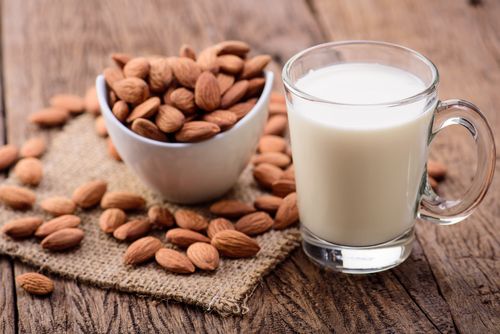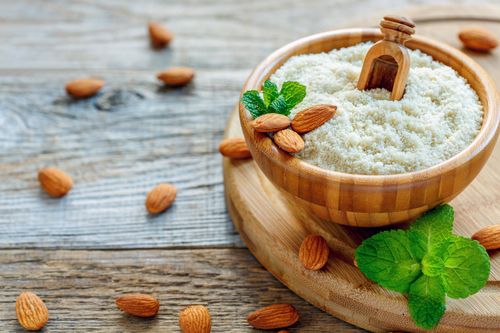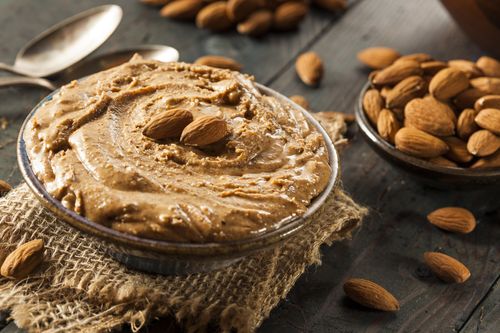
The tradition of adding almonds to desserts or serving them raw as religious offerings or snacks has been in many Indian households. Well, they aren’t so without reason. Almonds are edible seeds from almond trees. The nutritional benefits of almonds are astonishing. Not only are they filled with nutrients, but these nuts also have a versatile character. From sweet to savoury, you can find dishes that use almonds in some way or the other.
Interestingly, almonds are not nuts at all. From a botanical standpoint, they belong to the family of drupes, along with apricots and cherries. However, almonds are generally referred to as tree nuts due to their resemblance to other nuts. The modest size of almonds does not do justice to the immense goodness they contain. Read along and find out why.
Nutritional Values About Almonds
100 grams of almonds contain:
- Calories: 579 kcal
- Carbohydrates: 21.6 g
- Dietary fibre: 12.5 g
- Sugar: 4.4 g
- Fat: 49.9 g
- Protein: 21.2 g
- Vitamin E: 25.6 mg
- Riboflavin: 1.014 mg
- Manganese: 2.285 mg
- Magnesium: 268 mg
- Phosphorous: 484 mg
Nutritional Facts of Almonds:
- Almonds consist of 22% carbs, 21% protein, and 50% fat. Almonds are a great source of protein for vegetarians and vegans.
- They are calorie-dense food. Hence, one should watch portion size while consuming almonds.
- Almonds are an excellent source of vitamin E. 100 grams contain a whopping 171% of the daily recommended value.
- All B vitamins are present in almonds in reasonable quantities. In particular, riboflavin (B2) makes up 85% of the daily recommended value.
- Almonds contain a considerable amount of choline that is rare to find in food items.
- The mineral profile of almonds is impressive too. Manganese is accountable for 109% of the daily recommended value.
- Magnesium, phosphorous, and copper closely follow the list, with each of them over 50% of the daily requirement.
- Smaller amounts of zinc, calcium and iron are also present in almonds.
- Similar to other nuts, almonds are rich in phytosterols. These compounds are similar to cholesterol and block their absorption in the body.
Almond and The Fat Content
Many people are afraid of consuming almonds due to their high-fat content. It is indeed frightening to know that fat constitutes about 50% of an almond. However, there is no need to fret, as two-thirds of this fat is good for you. Furthermore, they are mono-unsaturated fats that are heart-friendly. Research also says that eating almonds as per the prescribed limit does not lead to weight gain. On the contrary, almonds enhance heart health and help in weight loss. Thus, the benefits of almonds are manifold.
Health Benefits of Almonds
1. Promotes heart health
Almonds lower LDL or bad cholesterol in the body and thereby ensure a healthy heart. The risks of heart ailments drastically reduce when almonds replace saturated fat in a diet.
2. Aids in weight loss
Although almonds are high in calories, they are rich in fibre and protein. These two components will help to keep you full for long hours. Subsequently, the tendency to snack on unhealthy options reduces, resulting in reduced calorie intake.
3. Contains many antioxidants
Antioxidants in almonds help to neutralise free radicals, which cause inflammations, ageing and even cancer. However, it is the skin of the almond that houses these antioxidants. So, avoid blanched almonds for this purpose.
4. Almonds work as an excellent substitute for flour in gluten-free diets
Almonds are perfectly safe for anyone who is gluten intolerant or on a gluten-free diet. Also, almonds help make up for the loss of iron, fibre and B vitamins in such diets.
5. Regulates blood sugar levels
Studies prove that almonds keep a check on blood sugar levels due to their fibrous nature. Moreover, if you combine almonds with some other foods, the glycaemic index of different foods reduces.
6. Increases energy
The high amounts of riboflavin in almonds help to release energy from the food consumed. They are energy encouragers. Copper and manganese also work to maintain the energy flow in the body.
7. Almonds provide vitamin E
The abundance of vitamin E in almonds has many benefits. They contain antioxidants that prevent cells from early oxidation damage. Vitamin E promotes eye health and boosts overall immunity as well. Also, this vitamin is crucial for healthy skin and the proper functioning of organs.
8. Reduces risk of gallstones
Almonds ensure the smooth functioning of the liver and gallbladder, mainly due to their fat and fibre component. Therefore, regular consumption of almonds reduces the possibility of gallstone diseases significantly.
9. Promotes bone health
Many nutrients in almonds, such as calcium, manganese, magnesium, copper, and zinc, are bone-friendly. Hence, they improve bone health with regular consumption.
Different Ways to Include Almond to Your Diet
The simplest way is to eat almonds in their raw form. You can buy dry-roasted, blanched, salted, sliced or slivered almonds as well. In terms of nutrition, dry-roasted almonds are closest to the raw ones. Tastier alternatives like chocolate-dipped and honey-roasted almonds are also available readily. However, those kinds of toppings add to the calories and sugar content.
1. Almond Milk
Almond milk is growing more popular by the day. Those who are lactose-intolerant or prefer plant-based foods can opt for almond milk. It does not contain any cholesterol and is rich in calcium and vitamins. Moreover, a cup of almond milk has only 40 calories to it. Therefore, Almond milk can replace cow’s milk in almost all recipes.
2. Almond Flour
Almond flour is a superb alternative to regular all-purpose flour. They are made of finely ground blanched almonds. Also, almond flour is gluten-free and has low carbs content. When compared to wheat flour, they are higher in nutrition as well as in calories. You can use almond flour for baking, pancakes or bread. Remember that almond flour has a high moisture content, and proportions may differ accordingly.
3. Almond Butter
If you are a fan of peanut butter, then almond butter is an excellent option for you. In particular, it is a blessing for those with peanut allergies. Both have a similar consistency and calories per tablespoon. However, the mineral and vitamin profile of almond butter is slightly higher. Spread it on a few slices of apple, and you have a delicious and filling snack.
Healthy Recipes using Almonds
While it is easy to eat almonds raw, they can become monotonous soon. However, these recipes are healthy and have a fun twist to them. In this way, you can include almonds in different styles in your diet.
#1 Almond pearls
It is no secret that almonds are a perfect snack. Follow this recipe to add an exciting punch of flavour to it.
Ingredients:
- Almonds (toasted) – 50 g
- Oats – 1 tbsp
- Pomegranate arils – 20 g
- Rice/Bran flakes – ¼ cup
- Curry leaves – 1 tsp
- Mustard seeds – ½ tsp
- Ghee (homemade is preferable) – ½ tbsp
- Cumin seeds – 1 tsp
- Red chilli powder – 1 tsp
- Pepper powder – ½ tsp
- Lemon juice – 1 tsp
- Salt – to taste
Method:
- Take a dry pan and toast the oats and rice/bran flakes in it. Then, keep it aside and let it cool down.
- Heat ghee in the same pan and mustard seeds and cumin seeds. Follow this with curry leaves.
- Now, add pomegranate arils, toasted oats and flakes.
- Toss in the toasted almonds and mix everything.
- According to taste, add salt, red chilli powder and pepper powder.
- Lastly, pour in the lemon juice and give it a mix.
- Garnish with coriander (optional).
#2 Almond smoothie
Almond smoothies are an excellent snack or even an on the go breakfast meal. The best part about smoothies is that there is no hard and fast rule. So, mix it up the way you like.
Ingredients:
- Almonds – 1 ½ tbsp
- Banana – 1
- Almond milk (unsweetened) – ¼ cup
- Non-fat or greek yoghurt – ½ cup
- Cocoa powder – ½ tbsp
Method:
- Make sure to peel and freeze the banana overnight. It makes the blending process more straightforward.
- Put the almonds, frozen banana and yoghurt into a blender. Add a little bit of almond milk to it.
- Blend it well until it becomes a fine mixture. Then, depending on your preferred consistency, adjust the amount of milk.
- Add cocoa powder if you like a chocolate finish to it.
- Add ice cubes if needed and blend everything.
- Once it gets a smooth consistency, pour into a glass and serve chilled.
Precaution
People with a nut allergy should stay away from almonds. They tend to have the same effects as other nuts. However, the symptoms may be severe in some people with difficulty in breathing or anaphylaxis. In addition, you may develop hives or an itchy rash within a few hours. In such cases, you should consult a doctor immediately and avoid further almond consumption.
References:
2. pubs.acs.org
Frequently Asked Questions (FAQs)
A. Around 6 to 8 almonds is a decent serving per day. Since almonds are high in calories, it is best to eat them in moderate amounts. Add almonds to your breakfast, as this is an ideal time. Digestion of almonds is easier in the mornings and optimises the health benefits, including regulating blood sugar and aiding weight loss. However, it is okay to have them for snacks as well, in the evenings too.
A. Yes, in some ways, soaked almonds are more beneficial to health. Soaking them for a couple of hours makes them soft and easy to digest. As a result, it increases nutrient absorption in the body when compared to raw almonds. Also, soaking reduces the level of anti-nutrients that inhibit the proper release of almond nutrition.
A. No, unlike some other nuts, almonds are easily digestible. Therefore, if you suffer from bloating and gas, then switch up your nuts with almonds. Avoid salted almonds to prevent water retention, as this may further lead to bloating. However, remember to eat them in moderation to avoid further problems.
A. The shelf life of almonds depends on how they are made and processed. In general, raw almonds are good to consume for up to 2 years when they are refrigerated. Storing them in the fridge or freezer is the best way to maximise their shelf life. Toasted almonds stay consumable for more extended periods when kept in a dry, air-tight container.









